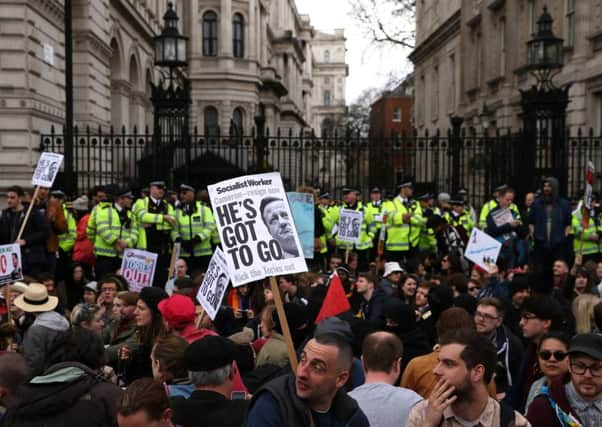Ian Swanson: Taxing times ahead in wake of Panama Papers


IF tax was not already the number one hot political topic, it is now. The Panama Papers – the unprecedented leak of millions of files from the world’s fourth biggest offshore law firm, detailing how the rich and powerful use tax havens to avoid paying their dues – have sparked fresh anger about the huge gap between the wealthiest in society and the rest of us.
It’s not so much about politicians publishing their tax returns as about laying bare the different worlds people live in.
Advertisement
Hide AdAdvertisement
Hide AdFor some, managing money evidently means channelling millions into offshore accounts. For others it’s about how long they can last before resorting to the food bank.
Raising taxes for the rich was already established as a key theme in the Holyrood election campaign as the parties spell out how they would use the new income tax powers coming to the Scottish Parliament.
Labour and the Lib Dems both propose a 1p increase; Labour would additionally bring back the top 50p tax rate; the Greens would make that 60p.
The SNP would opt out of George Osborne’s raising of the threshold for 40p taxpayers. The Tories oppose all these moves, arguing tax rates in Scotland must not be higher than those south of the Border.
Advertisement
Hide AdAdvertisement
Hide AdThe rival tax proposals have fuelled fierce arguments. The SNP has accused Labour of betraying poorer people by increasing the basic rate. Labour insists the increase in the personal allowance – the amount people can earn before they pay any tax – means no-one earning under £20,000 would pay any more than they do at the moment.
But Nicola Sturgeon’s rejection of an increase in the top rate – after previously backing it – has left her in an awkward place, especially when her reasoning – that rich people might move out of Scotland – leaves her open to the jibe that she’s using the same arguments as the Tories.
Polls suggest raising the top rate of income tax is the most popular tax proposal with voters.
And the Panama Papers reinforce people’s concerns about there being one rule for the rich and another for everyone else. Labour’s Kezia Dugdale summed up the mood when she told a rally in Portobello Town Hall at the weekend: “They’re getting away with it and it has to stop. Not since the MPs’ expenses scandal has there been such palpable anger, a sense of unfairness at the heart of our society.”
Advertisement
Hide AdAdvertisement
Hide AdAnd she was scathing about the idea the top rate should not be increased because the richest would try to avoid paying it. “I say that paying tax isn’t optional for you or me, so it shouldn’t be optional for the richest either. It isn’t the job of government to make excuses for why the rich won’t pay their taxes; it is the job of government to make sure the rich do pay their taxes.”
The Panama Papers revelations chime well with Labour’s anti-austerity message.
And whatever the rights and wrongs of their personal financial arrangements, David Cameron and his associates find themselves on the wrong side of the argument.
Commentators say people have already “priced in” his “posh boy” status into their assessment of the Prime Minister and so the revelations about his dad’s offshore funds will not affect his ratings.
Advertisement
Hide AdAdvertisement
Hide AdBut the Panama Papers – said to be only the tip of the iceberg – should force a change in the political debate and must surely mean an end, finally, to the nonsense of the government’s repeated claim that “we’re all in this together”.